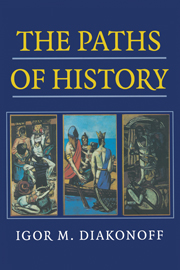Book contents
- Frontmatter
- Contents
- Foreword by Geoffrey Hoskins
- Preface
- Introduction
- 1 First Phase (Primitive)
- 2 Second Phase (Primitive Communal)
- 3 Third Phase (Early Antiquity)
- 4 Fourth Phase (Imperial Antiquity)
- 5 Fifth Phase (the Middle Ages)
- 6 Sixth Phase (the Stable Absolutist Post-Medieval Phase)
- 7 Seventh Phase (Capitalist)
- 8 Eighth Phase (Post-Capitalist)
- Index
8 - Eighth Phase (Post-Capitalist)
Published online by Cambridge University Press: 02 December 2009
- Frontmatter
- Contents
- Foreword by Geoffrey Hoskins
- Preface
- Introduction
- 1 First Phase (Primitive)
- 2 Second Phase (Primitive Communal)
- 3 Third Phase (Early Antiquity)
- 4 Fourth Phase (Imperial Antiquity)
- 5 Fifth Phase (the Middle Ages)
- 6 Sixth Phase (the Stable Absolutist Post-Medieval Phase)
- 7 Seventh Phase (Capitalist)
- 8 Eighth Phase (Post-Capitalist)
- Index
Summary
Thus far we have seen that capitalism created several alternative ideologies, such as Communism and Nazism. However, Nazism was based on the idea of universal conquest and militarisation, which was beyond the powers of its adherents. Communism proved to be more stable, but its stability in itself was responsible for bureaucratic stagnation and hence, naturally, economic impoverishment. In Eastern Europe, there have been attempts to forestall its ruin by military force (Hungary, 1956; Czechoslovakia, 1968). The attempts to spread the Communist idea beyond the ‘country of victorious Socialism’, i.e. the USSR, led to costly but fruitless attempts to support totalitarian regimes in Africa (i.e. in former colonies), and in Latin America. They could not be anything but fruitless, because the African dictatorships that supposedly were seeking ‘a way of non-capitalist development’ were in actual fact representing not the Seventh but, at best, the Fifth Phase of the historical process. Hence the endless wars, the unstable frontiers of the dominated territories, and the lack of any guaranteed human rights.
The ‘Communist’ economic system and ideology had two centres which since 1961 have been rivals: the USSR and China.
Note, however, that both the above mentioned alternative ideologies emerging in the Seventh, Capitalist Phase, namely Communism and Nazism, were leading mankind into an impasse; they could not guide society into any new Phase. The way to the Eighth Phase was prepared by an ideology opposed to both: the doctrine of human rights, which now became a very strong socio-psychological incentive.
- Type
- Chapter
- Information
- The Paths of History , pp. 324 - 338Publisher: Cambridge University PressPrint publication year: 1999

